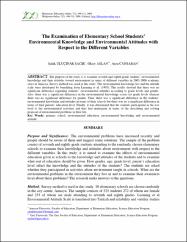İlköğretim Öğrencilerinin Çevre Bilgisi ve Çevre Tutumlarının Farklı Değişkenler Açısından İncelenmesi

View/
xmlui.dri2xhtml.METS-1.0.item-rights
info:eu-repo/semantics/openAccessDate
2008Metadata
Show full item recordAbstract
Araştırmanın amacı, 2005-2006 eğitim-öğretim yılında, Amasya'da seçilen ilköğretim okullarındaki yedinci ve sekizinci sınıf öğrencilerinin çevre bilgi ve tutumlarının çeşitli değişkenler bakımından incelenmesidir. Araştırmada tarama metodu kullanılmıştır. Leeming ve arkadaşları (1995) tarafından geliştirilen ölçekten yararlanılarak çevre bilgi ve tutum ölçeği geliştirilmiştir. Öğrencilerin çevre tutumlarında sınıf düzeyi ve cinsiyet değişkenlerine göre anlamlı bir fark bulunmamıştır. Çevre bilgilerinde ise sınıf düzeyine göre anlamlı fark varken cinsiyet değişkenine göre anlamlı bir fark olmadığı belirlenmiştir. Okullara göre öğrencilerin çevre bilgi ve tutumlarında anlamlı farklılıklar tespit edilmiştir. Öğrencilerin çevre etkinliklerine katılımlarının oldukça düşük seviyede olduğu; yaşadıkları yerdeki çevre sorunlarını tanıma ve bunlara çözüm önerileri getirmede yetersiz oldukları belirlenmiştir. Anne baba eğitim düzeyine göre öğrencilerin çevre bilgi ve tutumlarında anlamlı farklılık bulunmamıştır. Anahtar Sözcükler: ilköğretim, çevre eğitimi, çevre bilgisi, çevre tutumu The purpose of the study is to examine seventh and eighth grade students’ environmental knowledge and their attitudes toward environment in terms of different variables in 2005-2006 academic years in Amasya. Survey method was used in this study. The environmental knowledge test and the attitude scale were developed by benefiting from Leeming et al. (1995). The results showed that there was no significant difference regarding students’ environmental attitudes according to grade levels and gender. Also, there was a significant difference in the environmental knowledge scores for grade levels whereas there was no significant difference for gender. Then, there was a significant difference in the students’ environmental knowledge and attitudes in terms of their schools but there was no a significant difference in terms of their parents’ education level. Finally, it was determined that the students participated in the low level to the environmental activities and they had inadequate in terms of the describing and solving proposal of environmental problems in their life.
Source
İlköğretim Online (elektronik)Volume
7Issue
2URI
https://app.trdizin.gov.tr/publication/paper/detail/TnpjM016YzM=https://hdl.handle.net/20.500.12450/78

















